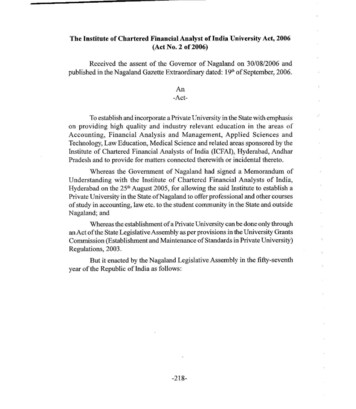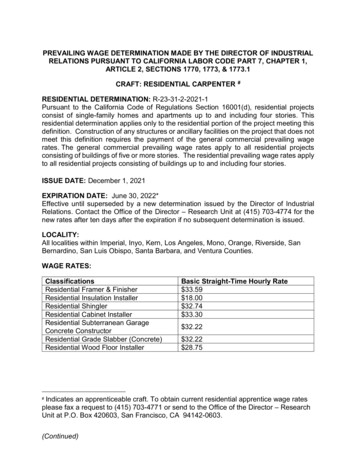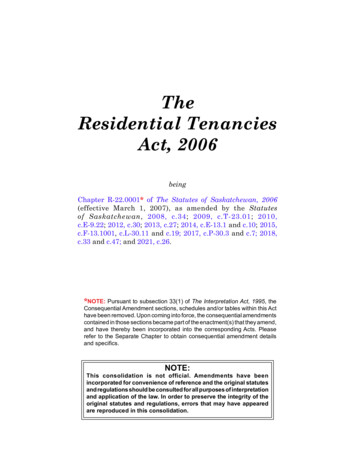
Transcription
1RESIDENTIAL TENANCIES, 2006c R-22.0001TheResidential TenanciesAct, 2006beingChapter R-22.0001* of The Statutes of Saskatchewan, 2006(effective March 1, 2007), as amended by the Statutesof Saskatchewan, 2008, c.34; 2009, c.T-23.01; 2010,c.E-9.22; 2012, c.30; 2013, c.27; 2014, c.E-13.1 and c.10; 2015,c.F-13.1001, c.L-30.11 and c.19; 2017, c.P-30.3 and c.7; 2018,c.33 and c.47; and 2021, c.26.*NOTE: Pursuant to subsection 33(1) of The Interpretation Act, 1995, theConsequential Amendment sections, schedules and/or tables within this Acthave been removed. Upon coming into force, the consequential amendmentscontained in those sections became part of the enactment(s) that they amend,and have thereby been incorporated into the corresponding Acts. Pleaserefer to the Separate Chapter to obtain consequential amendment detailsand specifics.NOTE:This consolidation is not official. Amendments have beenincorporated for convenience of reference and the original statutesand regulations should be consulted for all purposes of interpretationand application of the law. In order to preserve the integrity of theoriginal statutes and regulations, errors that may have appearedare reproduced in this consolidation.
2c R-22.0001RESIDENTIAL TENANCIES, 2006Table of Contents1PART IShort title , Interpretation, Applicationand General PrinciplesDIVISION 1Short title, Interpretation and ApplicationShort title2Interpretation3What this Act applies to4Act applies to tenancy agreement with a minor5What this Act does not apply to6Any agreement that this Act is not to apply is void7DIVISION 2General PrinciplesEnforcing rights and obligations of landlords and tenants24DIVISION 2Security DepositsLandlord may require security deposit25Limits on amount of security deposits26Landlord prohibitions respecting deposits27Tenant prohibition respecting deposits28Security deposits to be held in trust29Investment of security deposits30Interest on security deposits31Security deposits not attachable, etc.32Return of security deposit33Application by tenant34Non-compliance by landlordRepealed8Liability for not complying with this Act or atenancy agreement359Tenancy agreement not an interest in land36Repealed37Repealed38New landlord substituted for former landlord39When former landlord to remain subjectto liabilities and obligations10Common law applies11Frustrated contracts12Limits on landlord seizing tenant’s personal property13Effective date of commencement14PART IIAdministration of this ActAppointment of director and continuation of officeDIVISION 3Other Provisions40Future rent41Acceleration clause prohibitedRules about payment and non-payment of rent15Director’s responsibilities4216Director may approve forms43Terminating or restricting services or facilities17Director, hearing officers and staff must not becompelled in civil proceedings44Protection of tenant’s right to quiet enjoyment45Landlord’s right to enter rental unit46Tenant’s right of access protected47Right of tenant to display election advertising48Prohibitions on changes to locks and other access18PART IIIResidential TenanciesDIVISION 1Creating a Tenancy AgreementTenancy agreements include the standard conditions4919Requirements for written tenancy agreementsLandlord and tenant obligations to repairand maintain20Fixed term tenancies must be in writing50Assignment and subletting21Absence of certain information deems atenancy as a periodic tenancy51Leaving the rental unit at the end of a tenancy22Changes to tenancy agreement52PART IVRent IncreasesMeaning of “rent increase”53Rent increases22.1 Right of landlord to impose rules22.2 Tenancy agreements for housing programs23Application and processing fees prohibited53.1 Rent increases – fixed term tenancies54Timing and notice of rent increases – periodictenancies
3c R-22.0001RESIDENTIAL TENANCIES, 200655PART VEnding a TenancyDIVISION 1NoticeHow a tenancy ends56Tenant’s notice57Landlord’s notice: non-payment of rent58Landlord’s notice: cause59Landlord’s notice: end of employment withthe landlord60Landlord’s notice: landlord’s use of property60.1 Written agreement required61Tenant may end tenancy early followingnotice pursuant to section 6062Tenant’s compensation: section 60 notice63Form and content of notice to end tenancy64Incorrect effective dates automatically changedDIVISION 1.1Victims of Interpersonal Violence or Sexual Violence64.1 Interpretation of Division64.2Ending tenancy for interpersonal violence64.3Requirement for confidentiality65DIVISION 2Order of Possession of Rental UnitWhen landlord may regain possession of rental unit66Order of possession for the tenant67When landlord may apply for order toend tenancy and to gain possession68Landlord’s application for orderending tenancy early69What happens if a tenant does notleave when tenancy ended70PART VIApplications, Arbitrations,Proceedings and OrdersApplication to director70.1 Power of attorney – tenants7179PART VIIOffences and PenaltiesContravention of Act80Convicting court may order compensation818272Appeals73Hearing officers and powers on hearings74Director may schedule hearings together75Rules of evidence do not apply76Correction or clarification of decisions or orders77Enforcement of order by filing in court78Stay of proceedingsServicePART IXOther mattersDIVISION 1Service82.1 Order respecting serviceDIVISION 2Various Duties and Responsibilitiesof Landlords82.2 Power of attorney – landlord83Power of attorney – non-resident landlords84Landlord may not restrict occupancy onresidential property to certainmobile homes85Removal and disposition of abandonedgoods by landlord86Books and records – landlordDIVISION 3Investigations87Investigations88Copies of books and recordsDIVISION 4Other Matters respecting the Director and the Officeof Residential Tenancies89 Director to deposit money90Audit of Office of Residential Tenancies91Fiscal year of Office of Residential Tenancies92Annual reports of Office ofResidential Tenancies93Immunity94PART XRepeal, Transitional, Consequentialand Coming into ForceR.S.S. 1978, c.R-22 repealed95Transitional96S.S. 1993, c.C-26.1, section 77 amended97S.S. 2000, c.L-5.1 amended98R.S.S. 1978, c.P-33, section 14 amended99S.S. 1995, c.R-1.3, section 71 amendedMonetary limits for applications71.1 Time limit for applicationsRegulationsPART VIIIRegulations100S.S. 2004, c.S-0.1 amended101R.S.S. 1978, c.S-8 amended102R.S.S. 1978, c.T-2, section 36 amended103Coming into force
4c R-22.0001RESIDENTIAL TENANCIES, 2006
5RESIDENTIAL TENANCIES, 2006c R-22.0001CHAPTER R-22.0001An Act respecting Residential Tenancies andmaking consequential amendments to other ActsPART IShort title , Interpretation, Application and General PrinciplesDIVISION 1Short title, Interpretation and ApplicationShort title1This Act may be cited as The Residential Tenancies Act, 2006.Interpretation2In this Act:(a) “approved form” means a form approved by the director pursuant tosection 16;(a.1) “business day” means a day other than a Saturday, Sunday or holiday;(b) “common area” means any part of residential property the use of whichis shared by tenants, or by a landlord and one or more tenants;(c) “director” means the Director of Residential Tenancies appointedpursuant to section 14 and includes a deputy director;(d) “fixed term tenancy” means a tenancy under a tenancy agreement thatspecifies the date on which the tenancy ends;(e) “hearing officer” means a person appointed pursuant to section 73 andincludes the director;(e.1) “housing program” means a program offered pursuant to an Act oran Act of the Parliament of Canada that provides rental living accommodationto individuals during their participation in the program;(f) “landlord” means a person who grants to another person the exclusiveright of tenancy to a rental unit and includes any of the following:(i) the owner of the rental unit, the owner’s agent or another personwho, on behalf of the owner, grants to another person the exclusive rightof tenancy to a rental unit;(ii) the heirs, assigns, personal representatives and successors in titleto a person mentioned in subclause (i);
6c R-22.0001RESIDENTIAL TENANCIES, 2006(iii) a person, other than a tenant occupying the rental unit, who:(A) is entitled to possession of the rental unit; and(B) exercises any of the rights of a landlord under a tenancyagreement or this Act in relation to the rental unit;(iv) when the context requires, a former landlord;(f.1) “minister” means the member of the Executive Council to whom forthe time being the administration of this Act is assigned;(g) “mobile home” means a structure, whether ordinarily equipped withwheels or not, that:(i) is designed, constructed or manufactured to be moved from one placeto another by being towed or carried; and(ii) is used or designed to be used as a permanent or temporary residence;and includes the site on which the structure is located when the structure andsite are rented for residential purposes under a single agreement;(h) “periodic tenancy” means a tenancy on a weekly, monthly or otherperiodic basis under a tenancy agreement that continues until it is ended inaccordance with this Act;(i) “prescribed” means prescribed in the regulations;(j) “public housing authority” means a public housing authorityincorporated pursuant to section 18 of The Saskatchewan Housing CorporationAct and includes any other prescribed person;(k) “rent” means money paid or agreed to be paid, or value or a right givenor agreed to be given, by or on behalf of a tenant to a landlord in return for theright to possess a rental unit, for the use of common areas and for services orfacilities, but does not include any of the following:(i) a security deposit;(ii) a prescribed fee;(l) “rental unit” means living accommodation rented or intended to berented to a tenant;(m) “residential property” means:(i) a building, or related group of buildings, in which one or more rentalunits or common areas are located;(ii) the parcel or parcels of land on which the building, related group ofbuildings or common areas mentioned in subclause (i) are located;(iii) the rental unit and common areas;(iv) any other structure located on the parcel or parcels of land mentionedin subclause (ii); and(v) land intended to be used, and used, as a site for a mobile home usedfor residential purposes;
7RESIDENTIAL TENANCIES, 2006c R-22.0001(n) “security deposit” means money paid, or value or a right given, by or onbehalf of a tenant to a landlord that is to be held as security for any liabilityor obligation of the tenant respecting the residential property, but does notinclude any of the following:(i) post-dated cheques or negotiable instruments given for the purposeof paying rent;(ii) a prescribed fee;(o) “service or facility” includes any of the following that are provided oragreed to be provided by the landlord to the tenant of a rental unit:(i) appliances and furnishings;(ii) utilities and related services;(iii) cleaning and maintenance services;(iv) parking spaces and related facilities;(v) television, radio and electronic data facilities;(vi) laundry facilities;(vii) storage facilities;(viii)elevators;(ix) common recreational facilities;(x) intercom systems;(xi) garbage facilities and related services;(xii) heating facilities or services;(xiii) housekeeping services;(xiv) a prescribed service or facility;(p) “standard conditions” means the prescribed standard conditions of atenancy agreement;(q) “tenancy” means a tenant’s right to possession of a rental unit under atenancy agreement;(r) “tenancy agreement” means an agreement, whether written or oral,express or implied:(i) that is between a landlord and a tenant respecting possession of arental unit and use of any common areas and services and facilities thatare the subject of the agreement; and(ii) pursuant to which the tenant, or another person on the tenant’sbehalf, agrees to pay rent to possess the rental unit and to use any commonareas and services and facilities that are the subject of the agreement;
8RESIDENTIAL TENANCIES, 2006c R-22.0001(s) “tenant” includes:(i) the estate of a deceased tenant; and(ii) when the context requires, a former or prospective tenant.2006, c.R-22.0001, s.2; 2015, c.19, s.3.What this Act applies to3(1) Notwithstanding any other Act but subject to section 5, this Act applies totenancy agreements, rental units and other residential property.(2) Except as otherwise provided in this Act, this Act applies to a tenancy agreemententered into before, on or after the date on which this Act comes into force.2006, c.R-22.0001, s.3.Act applies to tenancy agreement with a minor4 Notwithstanding The Age of Majority Act, a person who has not reached 18 yearsof age may enter into a tenancy agreement as a tenant, and the tenancy agreementand this Act and the regulations are not unenforceable by and against that personby reason only of the fact that the person has not reached 18 years of age.2006, c.R-22.0001, s.4.What this Act does not apply to5This Act does not apply to:(a) living accommodation included with premises that:(i) are occupied for business purposes; and(ii) are rented under a single agreement;(b) living accommodation in a hotel, a motel, a motor hotel, a resort, a lodge ortourist camp, a cottage, a cabin, a trailer, a tourist home, a bed and breakfastestablishment, a farm vacation home or a hostel, if a person resides there forless than six consecutive months;(c) living accommodation provided for crisis or emergency shelters;(d) living accommodation:(i) in a hospital, health centre, addiction treatment centre, special-carehome, residential treatment centre or other facility that is designatedpursuant to The Provincial Health Authority Act;(ii) in a personal care home that is licensed pursuant to The PersonalCare Homes Act; or(iii) in a facility or an approved home as defined in The Mental HealthServices Act;
9RESIDENTIAL TENANCIES, 2006c R-22.0001(e) living accommodation that is located on property that is being farmed ifthe living accommodation is being rented by the person engaged in farmingthat property;(f) living accommodation provided by the Young Men’s Christian Association,the Young Women’s Christian Association or The Salvation Army;(g) living accommodation rented under a tenancy agreement that grants aright of occupancy:(i) for the life of the tenant; or(ii) for a fixed period of not less than 20 years; or(h) prescribed tenancy agreements, rental units or residential property,or prescribed categories of tenancy agreements, rental units or residentialproperty.2006, c.R-22.0001, s.5; 2015, c.19, s.4; 2017,c P-30.3, s.11-1.Any agreement that this Act is not to apply is void6 Every agreement or understanding, verbal or written, express or implied, thatthis Act or any provision of this Act does not apply, or that any benefit or remedyprovided by this Act is not available, is void.2006, c.R-22.0001, s.6.DIVISION 2General PrinciplesEnforcing rights and obligations of landlords and tenants7(1) The rights, obligations and prohibitions established by or pursuant to thisAct are enforceable between a landlord and tenant under a tenancy agreement.(2) A provision of a tenancy agreement is not enforceable if:(a) the provision is inconsistent with this Act or the regulations;(b) the provision is unconscionable; or(c) the provision is not expressed in a manner that clearly communicates therights and obligations under it.2006, c.R-22.0001, s.7.Liability for not complying with this Act or a tenancy agreement8(1) If a landlord or tenant does not comply with this Act, the regulations or theirtenancy agreement, the non-complying landlord or tenant must compensate theother for any damage or loss, including loss of rent paid or payable, that results.(2) A landlord or tenant who claims compensation for any damage or loss thatresults from the other’s non-compliance with this Act, the regulations or theirtenancy agreement must do whatever is reasonable to minimize the damage or loss.2006, c.R-22.0001, s.8.
10c R-22.0001RESIDENTIAL TENANCIES, 2006Tenancy agreement not an interest in land9(1) For the purposes of this Act, the relationship of landlord and tenant under atenancy agreement is one of contract only and does not create any interest in landin favour of the tenant.(2) A tenancy agreement is deemed not to be a lease within the meaning of TheLand Titles Act, 2000 or The Landlord and Tenant Act.2006, c.R-22.0001, s.9.Common law applies10 Except as modified or varied by this Act or the regulations, the common lawapplies to tenancy agreements.2006, c.R-22.0001, s.10.Frustrated contracts11(1) A tenancy agreement is terminated if, due to unforeseen circumstances thatprevent achievement of its objectives or render its performance illegal, it becomespractically impossible to complete.(2) The Frustrated Contracts Act applies to tenancy agreements.2015, c.19, s.5.Limits on landlord seizing tenant’s personal property12(1)A landlord must not:(a) seize any personal property of the tenant; or(b) prevent or interfere with the tenant’s access to the tenant’s personalproperty.(2) Clause (1)(a) does not apply if:(a) the landlord has a court order authorizing the action;(b) the landlord has an order respecting the tenant issued pursuant tosection 85; or(c) the landlord acts in accordance with subsections 85(4) to (6).2006, c.R-22.0001, s.12; 2018, c 33, s.3.Effective date of commencement13 A tenancy agreement may take effect from the date fixed for the commencementof the term of the tenancy agreement without actual entry of the premises that arethe subject of the tenancy agreement.2006, c.R-22.0001, s.13.
11RESIDENTIAL TENANCIES, 2006c R-22.0001PART IIAdministration of this ActAppointment of director and continuation of office14(1) The minister may appoint a Director of Residential Tenancies and one ormore deputy directors.(2) The Office of the Rentalsman continued pursuant to The Residential TenanciesAct, as that Act existed on the day before the coming into force of section 1 of thisAct, is continued as the Office of Residential Tenancies.(3) The Office of Residential Tenancies is to consist of:(a) the director and any deputy directors; and(b) any other officers and employees who are necessary to carry out theresponsibilities of the office and who are appointed in accordance with ThePublic Service Act, 1998.2006, c.R-22.0001, s.14; 2015, c.19, s.6.Director’s responsibilities15(1) The director is responsible for the administration and management of allmatters governed by this Act and all persons appointed pursuant to this Act.(2) Subject to any restrictions or conditions imposed by the minister or the director,a deputy director or any employee may exercise any of the director’s powers or fulfilany of the director’s duties pursuant to this Act or the regulations.(3) The director may establish rules of procedure for the conduct of hearingspursuant to section 70.(4)The director may do all or any of the following:(a) provide information to landlords and tenants about their rights andobligations pursuant to this Act;(b) help landlords and tenants resolve any dispute that can be or has beenthe subject of an application pursuant to section 70;(c) publish, or otherwise make available to the public, decisions or summariesof decisions made pursuant to section 70.2006, c.R-22.0001, s.15.Director may approve forms16(1)The director may approve forms for the purposes of this Act.(2) Deviations from an approved form that do not affect its substance and are notintended to mislead do not invalidate the form used.2006, c.R-22.0001, s.16.
12c R-22.0001RESIDENTIAL TENANCIES, 2006Director, hearing officers and staff must not be compelled in civil proceedings17 The director, a deputy director, a hearing officer and any other person employedin the administration of this Act are not compellable:(a) to give evidence in any court or in a proceeding of a judicial naturerespecting matters that come to their knowledge in the course of theiremployment; or(b) to produce records that are in the possession of the director or the Officeof Residential Tenancies because of the director’s powers or duties pursuantto this Act.2006, c.R-22.0001, s.17.PART IIIResidential TenanciesDIVISION 1Creating a Tenancy AgreementTenancy agreements include the standard conditions18 The standard conditions are conditions of every tenancy agreement.2006, c.R-22.0001, s.18.Requirements for written tenancy agreements19(1) A written tenancy agreement must comply with any prescribed requirementsand must contain all of the following:(a) the standard conditions;(b) the correct legal names of the landlord and tenant;(c) the address of the rental unit;(d) the date the tenancy agreement is entered into;(e) the address for service and telephone number of the landlord or thelandlord’s agent;(f) a telephone number the tenant may contact in the case of emergencies,including emergency repairs, if that number is different from the numberrequired by clause (e);(g)the agreed provisions respecting the following:(i) the date on which the tenancy commences;(ii) if the tenancy is a periodic tenancy, whether it is on a weekly, monthlyor other periodic basis;(iii) if the tenancy is a fixed term tenancy, the date the tenancy ends;
13RESIDENTIAL TENANCIES, 2006c R-22.0001(iv) the amount of rent payable for a specified period, and, if the rentvaries with the number of occupants, the amount by which it varies;(v) the day in the month, or in the other period on which the tenancy isbased, on which the rent is due;(vi) a provision that identifies whether the landlord or the tenant is topay for utilities;(vii) a provision setting out those services and facilities that are includedin the rent;(viii) the amount of any security deposit and the date the security depositwas or must be paid.(2) Within 20 days after a landlord and tenant enter into a written tenancyagreement, the landlord must give the tenant a copy of the signed agreement.(3) If a tenancy agreement is not in writing, the landlord must nevertheless providethe information required by clauses (1)(e) and (f) to the tenant, in writing, within 20days after the date that they enter into the tenancy agreement.(4) If the premises in or on which the residential property is situated contains morethan one rental unit and the landlord retains possession of part of the premises forthe common use of all tenants, the landlord shall post and maintain in a conspicuousplace in the premises or at or near the main entrance to the premises a prominentnotice containing:(a) the legal name of the landlord; and(b) the address for service and telephone number of the landlord or thelandlord’s agent.(5) A tenant’s obligation to pay rent is suspended if the landlord:(a) subject to subsection (6), in the case of a written tenancy agreement, doesnot provide a copy of the written tenancy agreement required by subsection (2);or(b) in the case of a tenancy agreement that is not in writing, does not providethe information required by subsection (3).(6) A landlord may apply for an order pursuant to section 70 that the tenant’sobligation to pay rent is not suspended pursuant to clause (5)(a) and that the tenantmust continue to pay rent if:(a) a tenant alleges that the landlord has not provided a written agreementthat fully complies with subsection (1); and(b) a hearing officer is satisfied that:(i) the landlord has provided the tenant with a written agreement thatsubstantially complies with subsection (1); and(ii) the tenant is not prejudiced by any error or omission in the writtenagreement mentioned in subclause (i).
14RESIDENTIAL TENANCIES, 2006c R-22.0001(7) A tenancy agreement is not invalid if a landlord fails to provide the informationrequired of the landlord pursuant to subsection (1) or (3) unless a hearing officer,on an application by the tenant for an order pursuant to section 70, is satisfied thatthe failure is significant and the tenant is prejudiced by the failure.2006, c.R-22.0001, s.19.Fixed term tenancies must be in writing20 To create a fixed term tenancy of three months or longer, the landlord andtenant must enter into a written tenancy agreement.2006, c.R-22.0001, s.20.Absence of certain information deems a tenancy as a periodic tenancy21 If a written tenancy agreement does not contain the information mentioned insubclause 19(1)(g)(iii), the tenancy is deemed to be a periodic tenancy on a monthlybasis.2006, c.R-22.0001, s.21.Changes to tenancy agreement22(1) A tenancy agreement must not be amended to change or remove a standardcondition.(2) Subject to section 53.1, a tenancy agreement may be amended to add, removeor change a term or provision, other than a standard condition, only if both thelandlord and tenant agree to the amendment.(3) The requirement for agreement pursuant to subsection (2) does not apply toany of the following:(a) a rent increase if notice is served on the tenant in accordance withsection 54;(b) a provision respecting which a landlord or tenant has obtained an orderpursuant to section 70 that the agreement of the other is not required.2006, c.R-22.0001, s.22; 2008, c.34, s.3.Right of landlord to impose rules22.1(1) Subject to subsection (2), in addition to the obligations set out in a tenancyagreement, a landlord may establish and enforce rules about:(a) the tenant’s use, occupancy or maintenance of the rental unit or residentialproperty, including rules prohibiting the possession, use, selling or distributionof cannabis or the growing and possession of cannabis plants in the rentalunit; and(b) the tenant’s use of services and facilities.(2) Subsection (1) applies if the rules are in writing, are made known to the tenantand are reasonable.
15RESIDENTIAL TENANCIES, 2006c R-22.0001(3) If an application is made for an order pursuant to section 70 on the groundsthat the rules imposed by a landlord pursuant to subsection (1) are not reasonable,a hearing officer may make any order that the hearing officer considers just andequitable having regard to the circumstances.2018, c 33, s.4.Tenancy agreements for housing programs22.2(1) A landlord of a rental unit that is used for a housing program may changethe terms of a tenancy agreement if:(a) the tenancy agreement as it exists before the change reflects therequirements of the housing program;(b) the housing program has changed or the rental unit is no longer part ofthe housing program; and(c) the change is reasonable and reflects the changes to or discontinuation ofthe use of the rental unit for the housing program.(2) If a change to a tenancy agreement made pursuant to subsection (1) resultsin an increase in rent, the landlord shall comply with the provisions of section 54.2015, c.19, s.7.Application and processing fees prohibited23 A landlord must not charge a person for:(a) accepting an application for a tenancy;(b) processing an application for a tenancy;(c) investigating an applicant’s suitability as a tenant; or(d) accepting a person as a tenant.2006, c.R-22.0001, s.23.DIVISION 2Security DepositsLandlord may require security deposit24(1) Subject to subsection (2), a landlord may require, in accordance with this Actand the regulations, a tenant to pay a security deposit as a condition of a tenancyagreement.(2) If the minister responsible for the administration of The SaskatchewanAssistance Act guarantees:(a) all of the payment of a security deposit, that guarantee is deemed be asufficient compliance by the tenant of payment of all of the security depositfor the purposes of this section; or
16c R-22.0001RESIDENTIAL TENANCIES, 2006(b) a portion of the payment of a security deposit, that guarantee is deemed bea sufficient compliance by the tenant of payment of that portion of the securitydeposit for the purposes of this section.2006, c.R-22.0001, s.24.Limits on amount of security deposits25(1) A landlord must not require or accept a security deposit that is greater thanthe equivalent of one month’s rent payable under the tenancy agreement.(2) If a landlord accepts a security deposit that is greater than the amount permittedpursuant to subsection (1), the tenant may deduct the overpayment from rent orotherwise recover the overpayment.(3) For the purposes of calculating the equivalent of one month’s rent for tenancyagreements where the rent is subsidized by a public housing authority, the rent isto be calculated without regard to the amount of the subsidy.2006, c.R-22.0001, s.25.Landlord prohibitions respecting deposits26(1)No landlord shall do any of the following:(a) require a security deposit at any time other than when the landlord andtenant enter into the tenancy agreement;(b) require or accept more than one security deposit respecting a tenancyagreement;(c) require, or include as a provision of a tenancy agreement, that the landlordautomatically keeps all or part of the security deposit at the end of the tenancy.(2) Notwithstanding clause (1)(a), a landlord may require a tenant to pay a securitydeposit after the time when the tenancy agreement is entered into if:(a) at the time the tenancy agreement was entered into, the ministerresponsible for the administration of The Saskatchewan Assistance Actguaranteed the payment of all or a portion of the security deposit; and(b) subsequently, the minister responsible for the administration of TheSaskatchewan Assistance Act withdraws the guarantee mentioned in clause (a).(3) No landlord shall give notice to vacate a rental unit or refuse to renew a tenancyagreement for the sole purpose of increasing the security deposit for that rental unit.(4) If a landlord requires a tenant to pay a security deposit, the landlord may onlyrequire the tenant to pay:(a)not more than 50% of the amount of the security deposit:(i) at the date the tenancy agreement is entered into; or(ii) if the landlord is authorized pursuant to subsection (2) to requirea security deposit during the tenancy, within one month after the dateof service on the tenant of a writ
18 Tenancy agreements include the standard conditions 19 Requirements for written tenancy agreements 20 Fixed term tenancies must be in writing 21 Absence of certain information deems a tenancy as a periodic tenancy 22 Changes to tenancy agreement 22.1 Right of landlord to impose rules 22.2 Tenancy agreements for housing programs
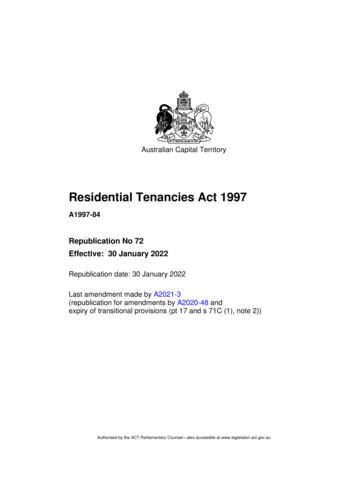
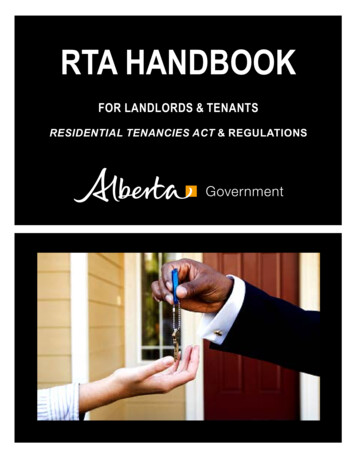
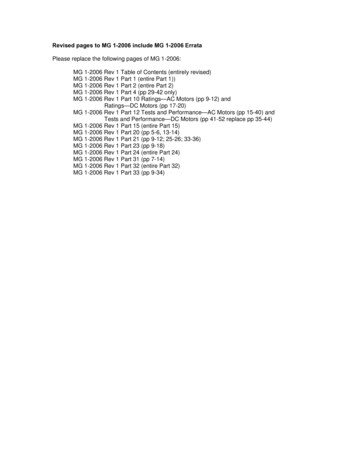
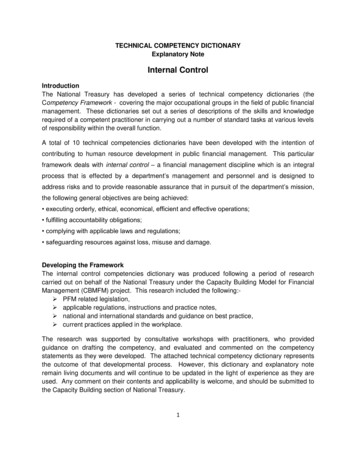


![Civil Union Act [No. 17 of 2006] - SAFLII](/img/46/cua2006139.jpg)
